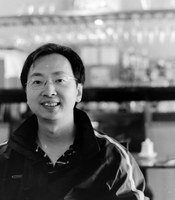
Dr Qian (Kevin) Wang
Position:
- Reserach Officer, Origins of Cancer Laboratory, Gene and Stem Cell Therapy Program , Centenary Institute
Websites:
Biography:
Dr Wang graduated with a Bachelor degree in the Department of Biophysics and Physiology at Fudan University in 1998. He obtained his PhD from Lens Research Laboratory at the University of Sydney in 2008, under the supervision of Professor Frank Lovicu and Professor John McAvoy. His PhD research examined MAPK and PI3K signalling pathways that involved in lens fibre cell differentiation.
His postdoctoral research is supervised by Associate Professor Jeff Holst and Professor John Rasko in the Origins of Cancer Program and Gene and Stem Cell Therapy Program at the Centenary Institute. His study is focussed on the role and regulation of amino acid transporters and their related signalling pathways in prostate cancer.
As a Research Officer at the Centenary Institute Dr Wang draws on the Institute’s strong international track record in amino acid regulation, to dissect how transporters including leucine transporters (LAT1 and LAT3) and glutamine transporter (ASCT2), may promote prostate cancer. He conducts these studies using prostate cancer cell lines and a prostate cancer mouse model crossed with a new knockout mouse model with the objective of analysing the genes involved in the onset and progression of prostate cancer.
Amino acid transporters are potential targets for therapeutic intervention, and Dr Wang believes that understanding this complex network may provide new insights into the effect of diet (particularly red meats and dairy which are high in leucine) on the development and progression of prostate cancer.
Current areas of collaboration: amino acid transporter.
Best publications:
Wang Q, Hardie RA, Hoy AJ, van Geldermalsen M, Gao D, Fazli L, Sadowski MC, Balaban S, Schreuder M, Nagarajah R, Wong JJ, Metierre C, Pinello N, Otte NJ, Lehman ML, Gleave M, Nelson CC, Bailey CG, Ritchie W, Rasko JE, Holst J. (2015). Targeting ASCT2-mediated glutamine uptake blocks prostate cancer growth and tumour development. Journal of Pathology. 236(3):278-89. PMID: 25693838.
Wang Q, Grkovic T, Font J, Bonham S, Pouwer RH, Bailey CG, Moran AM, Ryan RM, Rasko JE, Jormakka M, Quinn RJ, Holst J. (2014). Monoterpene glycoside ESK246 from Pittosporum targets LAT3 amino acid transport and prostate cancer cell growth. ACS Chemical Biology. 9 (6), 1369-1376. PMID: 24762008.
Wang Q, Beaumont KA, Otte NJ, Font J, Bailey CG, van Geldermalsen M, Sharp DM, Tiffen JC, Ryan RM, Jormakka M, Haass NK, Rasko JEJ and Holst J. (2014). Targeting glutamine transport to suppress melanoma cell growth. International Journal of Cancer. 135, 1060-1071. PMID: 24531984.
Wang Q, Tiffen J, Bailey CG, Lehman ML, Ritchie W, Fazli L, Metierre C, Feng YJ, Li E, Gleave M, Buchanan G, Nelson CC, Rasko JEJ, Holst J (2013). Targeting Amino Acid Transport in Metastatic Castration-Resistant Prostate Cancer Suppresses Cell Cycle, Cell Growth and Tumor Development. Journal of the National Cancer Institute: 105(19):1463-1473.
Wang Q, Bailey CG, Ng C, Tiffen J, Thoeng A, Minhas V, Lehman ML, Hendy SC, Buchanan G, Nelson CC, Rasko JE, Holst J. (2011). Androgen receptor and nutrient signaling pathways coordinate the demand for increased amino acid transport during prostate cancer progression. Cancer Research. 71, 7525-7536.
amino acid transporter, cancer progression, metastases, normal functioning, nutrition, oncogenes and tumour suppressor genes, signal transduction.


